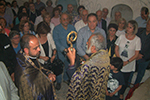Հարութ Սասունյանի սյունակը

SENATORS QUESTIONS WERE FAR MORE MEANINGFUL THAN AMBASSADOR S ANSWERS
The State Department tried to pull a fast one on the Senate last week by attempting to rush through the confirmation of Marie Yovanovitch, the nominee for U.S. Amba
ssador to Armenia, even though she had failed to answer questions posed by several Senators.
Eight Senators
had submitted written questions to Amb. Yovanovitch by Friday, June 20 deadline, the day after her hearing. As the vote for her confirmation by the Senate Foreign Relations Committee was scheduled for Tuesday, June 24, the State Department worked overtime during the weekend and Monday, June 23, to respond to the Senators' questions. One wonders why the Bush administration is in such a big hurry to get her confirmed, after callously leaving the post of Ambassador to Armenia vacant for almost two years, following the recall of Amb. John Evans?
By the time the Committee met on Tuesday, Amb. Yovanovitch had responded to questions submitted by five of the eight Senators. The answers she had drafted, undoubtedly under State Department direction, were inadequate, incomplete and evasive. The Senators' questions turned out to be far more principled and insightful than Amb. Yovanovitch's non-responsive answers.
Below are some of the questions asked by Senate Foreign Relations Committee members:
Sen.John Kerry (Democrat-Massachusetts) submitted 12 questions:
- "I strongly believe that the killings and other atrocities perpetrated against some 1.5 million Armenians by the Ottoman Empire beginning in 1915 clearly constituted genocide.... We must change U.S. policy to reflect the true nature of the tragic events that were perpetrated against the Armenians by calling them what they were: genocide." Then quoting from several historical documents, including Pres. Reagan's 1981 proclamation mentioning the Armenian Genocide, Sen. Kerry asked: "Do you dispute any of the above?"
- "As the U.S. Ambassador to Armenia, would you personally work to change U.S. policy and have these atrocities acknowledged as a genocide?"
- "As the U.S. Ambassador to Armenia, what actions, if any, would you take against your employees, if they properly characterized the massacres of Armenians during WWI as a genocide?"
- "If the Republic of Turkey recognized the genocide, would the United States then recognize it also?"
Sen. Robert Menendez (Democrat-New Jersey) submitted 19 questions:
- "Do you believe there can be reconciliation between Turkey and Armenia, without an acknowledgment of the genocide by Turkey?"
- "In 1951 U.S. court filing with the International Court of Justice, the filing stated that, the Turkish massacres of Armenians, the extermination of millions of Jews and Poles by the Nazis are outstanding examples of the crime of genocide.'" Sen. Menendez also mentioned Pres. Reagan's 1981 proclamation.
- "How can we expect Turkey to come to terms with its past when we, as Americans, are unwilling to speak honestly about the Armenian Genocide?"
- "...Amb. John Evans, who was fired for speaking truthfully about the Armenian Genocide -- what lessons do you draw from Amb. Evans' experience, particularly the way in which his tenure in Yerevan and his diplomatic career were ended?"
- "Do you know of other cases where the President limits speech of Department of State employees based on his policy determinations on the characterization of historical events?"
- "How does the Administration's non-use of the genocide term advance U.S. efforts to promote Armenian-Turkish reconciliation?"
- "The President's policies are not promoting an honest reexamination of its history, but actually intensifying Turkey's denial of the Armenian Genocide.
- What evidence can you identify for us today that can inspire any trust by the Senate that those words of facilitating dialogue have borne any real results?"
Sen. Joe Biden (Democrat-Delaware) submitted 5 questions:
- "What has the State Department done to end Turkey's denial of the Armenian Genocide?"
Sen. Barbara Boxer (Democrat-California) submitted 12 questions:
- "Do you acknowledge that the U.S. government affirmed the Armenian Genocide in its 1951 International Court of Justice (ICJ) filing?" For a change, Amb. Yovanovitch gave a direct answer: "It is my understanding that the U.S. government did file this document with the International Court of Justice in 1951."
- "Do you fear you could lose your job or be demoted if you were to use the word genocide' to describe the atrocities committed against the Armenians?"
- "Will you consult with former Amb. John Evans before you depart for Armenia?" She answered: "Yes."
Regardless of what question she was asked, Amb. Yovanovitch repeated the following lines: "The specific terminology the Administration uses to refer to this tragedy is a policy determination made by the President.... The Administration has never denied the facts of what happened in 1915.... The Administration [wants] to promote understanding and reconciliation between the people and governments of Armenia and Turkey."
Needless to say, the Senate Foreign Relations Committee was dissatisfied with Amb. Yovanovitch's non-responsive answers to the Senators' questions and her no response at all to questions submitted by three other Senators: Barack Obama (Democrat-Illinois), Norm Coleman (Republican-Minnesota) and Russ Feingold (Democrat-Wisconsin). To make matters worse, Committee members could not properly review her responses given the short few hours they had between receiving her answers and the scheduled confirmation vote.
Under these circumstances, the Senate Foreign Relations Committee had no choice but to postpone consideration of Amb. Yovanovitch's nomination, which is what Sen. Boxer formally requested.
When the Committee reconvenes sometime in July, it remains to be seen whether the Senators would demand that she provides more direct answers to their questions. Any further postponement of her confirmation would practically kill her nomination, as the Senate would soon interrupt its meetings due to the summer recess and upcoming presidential and congressional election campaigns.
It would be a shame if such a qualified Foreign Service Officer as Amb. Yovanovitch were to be punished as a result of Bush administration's immoral stand on the Armenian Genocide and its stubborn refusal to meet with leaders of major Armenian-American organizations to discuss this critical issue.
By Harut Sassounian
Publisher, The California Courier




















